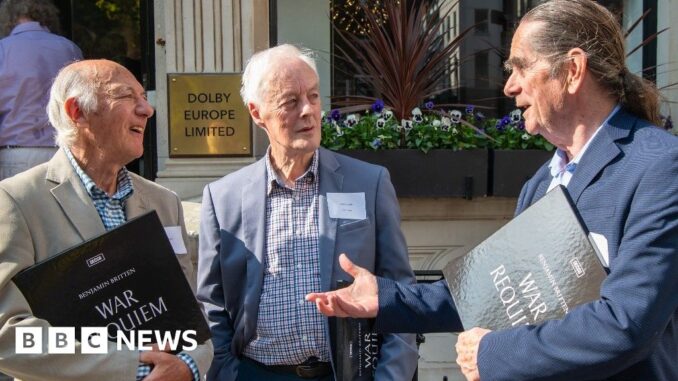
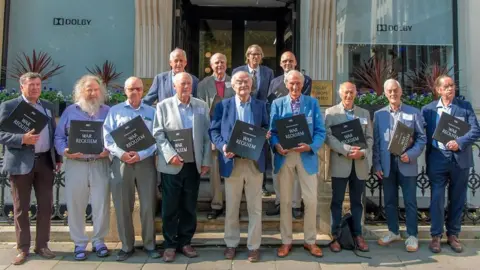 Carsten Windhorst
Carsten WindhorstA chorus of schoolboys who sang on a world-famous rendition of Benjamin Britten’s War Requiem have been reunited, thanks to an advert in a local newspaper.
The recording, made in 1963, sold 200,000 copies in just five months (almost unheard of for a classical work) and won Britten two Grammy Awards – but the choristers, from London’s exclusive Highgate School, were never listed in the credits.
Last year, Decca Records launched a search for the surviving members, with a notice in London’s Ham & High newspaper.
Fifteen of them were able to reunite in Soho on Thursday, to hear a cleaned-up version of the Requiem and relive the “gruelling” experience of recording Britten’s masterpiece.
“It was like going through some great storm, a great orchestral storm,” recalled Tim Healey, who was 13 at the time of the original recording.
“By the time it was over, I was quite glad it was over – but then you look back and think, ‘That was pretty amazing’.”
Former chorister Nigel Law added: “I still remember the first day, which was a washout, thanks to [Russian soprano] Galina Vishnevskaya throwing a completely and utter wobbly.
“It was quite disturbing, hearing this woman scream.”
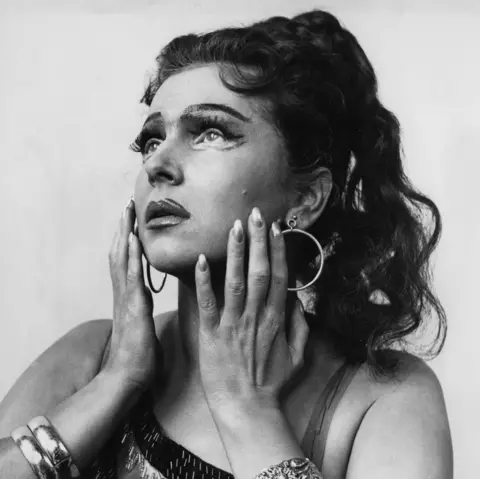 Getty Images
Getty ImagesAccording to producer John Culshaw, Vishnevskaya was upset because she had been placed on a balcony, next to the adolescent choirboys.
She had failed to appreciate that the work was conceived on different physical planes, with the soprano and the choir raised above the other singers, representing heaven.
Instead, she saw her position “as a kind of discrimination”, as the male soloists, Peter Pears and Dietrich Fischer-Dieskau, were at the front, near the conductor.
“I only know she didn’t want to be with us boys,” said Healey.
“That’s all I took away from it.”
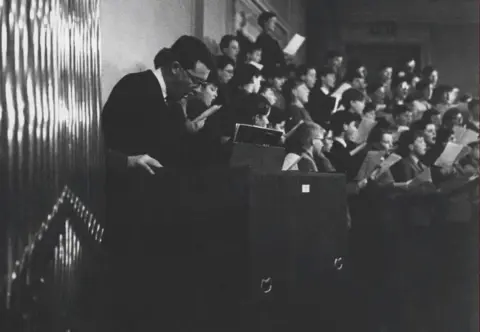 Alice Faure / Decca Records
Alice Faure / Decca RecordsThe War Requiem was commissioned to mark the consecration of the new Coventry Cathedral in 1962, after the original 14th Century building was destroyed in a World War Two bombing raid.
It interweaves the traditional Latin text of the Requiem Mass with the anti-war poetry of soldier Wilfred Owen, who was killed a week before the Armistice.
Deeply moving, and often harrowing, the score was immediately declared a masterpiece.
Reviewing the world premiere in 1962, the Times’ critic, William Mann, wrote that the Requiem was “so superbly proportioned and calculated, so humiliating and disturbing in effect, in fact so tremendous, that every performance it is given ought to be a momentous occasion.”
Deep impact
The 1963 recording was made at Kingsway Hall in Holborn, and the weight of Owen’s poetry was not lost on the young choristers.
“It had a terrible resonance in the beginning of 1963, immediately following the Cuban Missile Crisis,” Healey told the BBC.
“You know, we were on the brink of the extinction of the entire human race, so those anti war lyrics, especially that poem, Futility, had a deep impact on me.
“You know, what is the point of it all? What is the point of striving for success in singing competitions or your English essays if it’s all going to end tomorrow?”
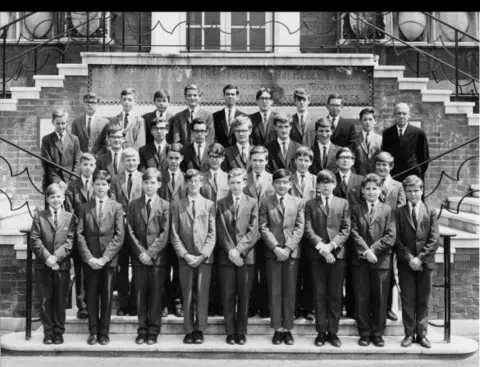
Decca Records recently reissued its recording of War Requiem, having preserved the fragile 1963 master tapes by baking them and digitising their contents.
In preparing the new mixes, the record label also discovered recordings of the original rehearsals, where Britten himself conducted the choir.
“Boys I know it’s first thing in the morning but please don’t make it sound like it is,” he can be heard telling the teenagers.
“Don’t make it sound nice. It’s horrid, it’s modern music.”
Hearing those comments “put me right back” in the recording studio, said Law, explaining that Britten’s use of tonal ambiguity “didn’t fit the normal frame of reference for a school choir”.
“I thought we we were supposed to sound nice,” agreed Healey. “I hadn’t really twigged that he was looking for a bit more earthiness and a bit more bite.”
“It certainly emboldened me to sing out a little more,” added Hedley Rokos, who was 16 at the time of the recording.
“And it must have suited his purpose, or he would have asked us to rebalance.”
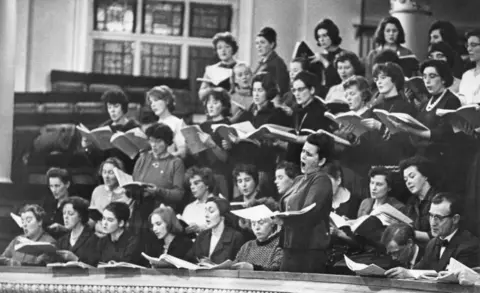 Getty Images
Getty ImagesThe 1963 recording is still considered as one of the definitive versions of the War Requiem, alongside Richard Hickox’s celebrated 1991 recording and the 1969 live performance, conducted by Carlo Maria Giulini at the Royal Albert Hall.
Britten was later created a life peer, the first musician or composer to be elevated to the peerage. After his death in 1976, stories emerged about his fascination with teenage boys, partially overshadowing his legacy – although biographers have argued he never crossed the line into abusive conduct.
Those accusations were far from the minds of the choristers who reunited on Thursday, who said they remembered “the emotions, the excitement and the fun” of recording with Britten.
Many of the schoolboys went on to have successful careers in music, including renowned composer John Rutter and John Blakely, who was a professor at the Royal College of Music for over 30 years.
Others who attended Thursday’s event went in different directions. Nigel Law became a software engineer, Roderick Langley Shelton was an architect and Michael Cook runs a charity for those working in the dairy industry.
Getting the choir back together after 60 years was “absolutely great”, said Healey.
“There are people here whose names I had forgotten, whose place in my life I had forgotten, and it’s great to reacquaint myself with them.
“It’s been absolutely overwhelming.”



Be the first to comment